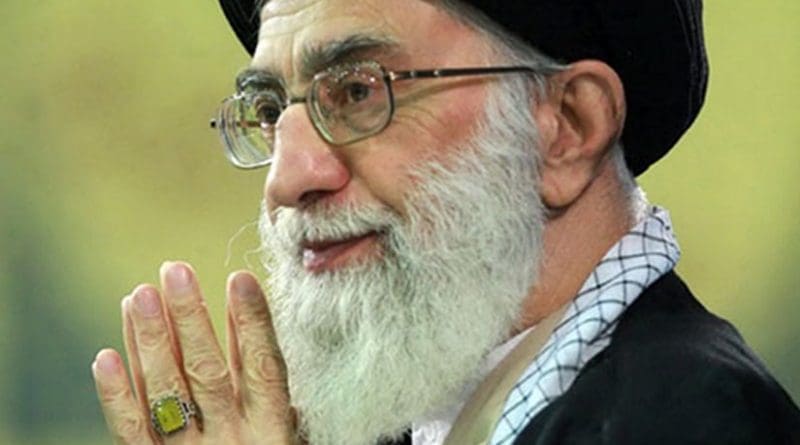Signs Of A Persian Gulf – Analysis
By Observer Research Foundation
By Harsh V. Pant
During his Id sermon delivered on June 26, Iran’s Supreme Leader Ayatollah Ali Khamenei ended up equating the Kashmir conflict with those in Yemen and Bahrain. He is reported to have said: “Conflicts in Yemen, Bahrain, problems in all Islamic countries, are major wounds on the body of Islam. The world of Islam should explicitly support the people of Yemen, and express [its] disdain against the oppressors who’ve attacked the people in such horrible ways during the month of [Ramzan]… The same is true for the people of Bahrain and Kashmir: Our people can back this great movement within the world of Islam.”
Though this took many observers by surprise, the Ayatollah has been talking of Kashmir for quite some time. In 2010, he had sermonised: “Helping the Palestinian nation and the besieged people of Gaza, sympathy toward and cooperation with the people of Afghanistan, Pakistan, Iraq and Kashmir… safeguarding the unity of Muslims… and spreading awakening and [a] sense of commitment and responsibility among Muslim youth in all Islamic lands — these are great responsibilities that currently lie on the shoulders of prominent figures of the Islamic Ummah.”
Politics in the Arab world
So there is nothing new in his recent statement, and New Delhi has done well not to give it too much weight. India’s relations with Iran are important and the reformist regime of Hassan Rouhani is looking for a wider global engagement. The Ayatollah’s statement probably reflects his country’s concerns about getting regionally isolated at a time when the Donald Trump administration’s hard line against Tehran seems to have emboldened Saudi Arabia and its allies to squeeze Iran out of the regional matrix. The de facto blockade of Qatar by Saudi Arabia, Egypt, Bahrain and the United Arab Emirates (UAE) after cutting off diplomatic ties last month underscores this complex reality. Qatar has been issued a 13-point list of demands which includes curbing diplomatic ties with Iran, severing ties with the Muslim Brotherhood and shuttering the Al-Jazeera news network. This has been rejected by Qatar. Riyadh has further warned that more punitive measures would follow if Qatar embraces Iran any further.
Saudi Arabia and Iran are engaged in a range of proxy wars across the region — in Bahrain, Syria, Yemen, apart from their growing hostility in Iraq. Ever since the Islamic Revolution of 1979, Riyadh and Tehran have struggled to shape the Gulf in consonance with their own interests, using religion instrumentally to hide their pursuit of power. An attack on Iran’s Parliament on June 7, for which it blames Saudi Arabia, has further heightened the tensions.
The Ayatollah’s recent utterance on Kashmir might be a signal to India that its growing closeness to Saudi Arabia and the UAE is being watched closely in Tehran. It’s a reminder to India that Iran too has a role in the Islamic world which can’t be ignored.
Yet, the emergence of Kashmir in India-Iran bilateral discourse is nothing new. India has always been wary of Iran’s support for Pakistan in the Organisation of Islamic Cooperation (OIC) regarding Kashmir. Iranian criticism of India’s position on Kashmir has repeatedly sparked protests within the Indian government against Iranian interference.
Economic ties turn tepid
However, as regards bilateral relations, the recent decline in economic ties should be of greater concern to the two countries. Iran seems to be in no hurry to decide on awarding the contract for gas exploration in its Farzad B offshore field to ONGC Videsh. Pending a decision on the contract, India has decided to decrease the volume of Iranian crude oil it will be buying this year. There have been reports that Tehran has signed an initial agreement for the gas field with Russian giant Gazprom. For India, which stood by Iran during the height of its global isolation, this is certainly galling.
Further, the slow pace of the Chabahar port project has irked the Iranians and they have indicated that despite India developing the project, it won’t be exclusive to the country. Pakistan and China might also be invited to get involved. For India, this undercuts the very strategic utility of the port — viewed as India’s answer to the Gwadar port that will allow it to circumvent Pakistan and open up a route to landlocked Afghanistan.
While New Delhi has done well to ignore the Ayatollah’s provocation on Kashmir, it needs to work with the Rouhani government to ensure that the bilateral irritants in fostering economic ties are resolved soon. There are far too many issues, including the future of Afghanistan, that require closer coordination between the two countries.


“Saudi Arabia and Iran are engaged in a range of proxy wars across the region “:As are the US,NATO,Israel,Russia